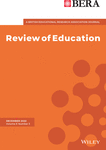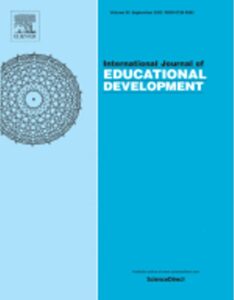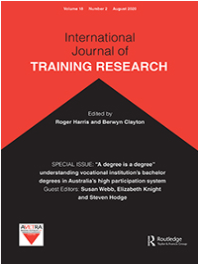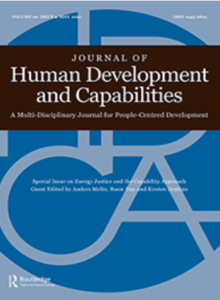Research achievement
|
Nozomi Sakata, Nicholas Bremner, Leanne Cameron This article provides a comprehensive descriptive overview of the implementation of learner-centred pedagogy (LCP) in low- and middle-income countries. Considerable time, money and resources have been invested in LCP in many countries worldwide, and yet we still lack a comprehensive body of evidence regarding its implementation and outcomes. This systematic review aimed at going beyond the limitations of individual studies, confined by time, context and samples, in order to offer stronger applicability and generalisability to wider contexts. The dataset for analysis consisted of 94 journal articles published between January 2001 and December 2020, selected based on explicit inclusion/exclusion criteria. A team of three researchers utilised EPPI-Reviewer and QSR NVivo to import, screen, and analyse the texts. The literature on LCP implementation was mapped by key variables such as country, educational setting, study participants, and methods. Firstly, the study found that despite LCP being explicitly promoted in numerous contexts, most classrooms were still predominately teacher-centred. Secondly, the review identified a wide range of constraints and enablers of LCP implementation, spanning across the individual, classroom, school, policy, and wider society levels. Thirdly, although several positive and negative outcomes of LCP emerged from the study, the review found that the objective evidence on LCP outcomes was somewhat limited, indicating that there is an urgent need for additional research to evaluate LCP outcomes. A conceptual framework of LCP implementation is presented, and implications for policy and future research are discussed. |
 |
|
|
The Outcomes of Learner-Centred Pedagogy: A Systematic Review Nicholas Bremner, Nozomi Sakata, Leanne Cameron
An increasing number of studies have investigated the implementation of Learner-Centred Pedagogy (LCP) in different countries, but there is still limited empirical evidence on what impacts LCP may have on learners and learning. This article summarises the findings of a systematic review of 62 journal articles reporting the outcomes of LCP implementation in low- to middle-income countries. The review found relatively few studies that provided objective evidence of LCP effectiveness. A higher number of studies identified non-objective perspectives of LCP effectiveness, such as teacher and student perceptions, as well non-cognitive outcomes such as increased student motivation, confidence, and enhanced relationships.
|
 |
|
|
Mohd Ali Samsudin, Melanie Carmen Moen, Pham Thi Thanh Hai, Belay Hagos Hailu, Arif Hidayat, Yoko Ishida, Tatsuya Kusakabe, Hiroaki Ozawa, Nor Asniza Ishak, Shaik Abdul Malik, Bin Mohamed Ismail, Toyin Eunice Owoyemi, William AL Anangisye, Nkanileka Loti Mgonda, Joyce Ayikoru Asiimwe, Charles Kyasanku Indicators for the Measurement of Teachers’ Professional Identity across Asia and Africa: A Delphi Study. Journal of Asian and African Studies The research was initiated and analyzed by the 14 researchers who joined from the Africa-Asia University Dialogue network(A-A Dialogue). Teacher identity is a complex, multifaceted and dynamic configuration of personal and professional factors that influence each other, and teacher identity formation is understood as a process that involves the interrelated dimensions of personal experience, professional practice and the external environment. The concept of Teacher Professional Identity is rather constructed by the individual who carries out the role and is based on person’s values, feelings, attitudes, ethnicity and culture than educator’s role as teacher. If so, the concept of TPI could be described by the answers to the question ‘What am I as a professional?’ The answer to such a question lies on multiple dimensions of individual, social and institutional factors, so TPI is defined as the synergy of the meaning constructed by teachers based on personal, social and institutional dimensions of the expected role of being a teacher. Research for TPI is famous in developed countries but few in developing countries, so this study was to conduct a Delphi survey technique in order achieve a consensus about the indicators of TPI that are valid for African and Asian regions. African and Asian researchers use questionnaire to conduct TPI studies. In the Delphi study process, the researchers used three rounds to validate the teacher professional identity. First, researchers from Africa and Asia had open-ended discussion to list indicators of TPI. Second, they sent a questionnaire consisting of TPI indicators suggested in the first round. Third, the experts were asked to assess the level of relevance of each item. Researchers made indicators from personal, social and institutional domains. Experts were seriously concerned about possible confusion among respondents from different social, cultural or economical contexts. This study can be concluded that despite the different social contexts, the results of the Delphi Study indicated a high level of consensus among the research teams from Asia and Africa on most items in the instrument. In Africa and Asia, there are essentially few differences between the characteristics of TPI in personal, social and institutional domains. |
 |
|
|
Choi, S. (2021). The impact of education levels and paths on labor market outcomes in South Korea: Focusing on vocational high school graduates. Social Sciences & Humanities Open, 4(1), 1-10. A researcher, Seonkyung Choi at Center for the Study of International Cooperation in Education (CICE) recently published an article titled “The impact of education levels and paths on labor market outcomes in South Korea: Focusing on vocational high school graduates” in Social Sciences & Humanities Open, Elsevier journal. The paper has considered that the predominant perception in South Korea is that the route to the best jobs is to attend university. Even two-thirds of vocational high school graduates now go to university. The paper examines the impact of different education paths on employment and wages. Unlike previous research, it takes account of Korea’s unusual education system. It uses not only probit and ordinary least squares models but also a conditional expectation correction method model to tackle unobserved heterogeneity. The paper finds vocational secondary education followed by direct entry into the labor market yields better employment status and wages than higher education, when controlling for family and individual characteristics. This result challenges the appropriateness of Korea’s current education strategy of maximizing higher education enrollments. Further study will be investigated the job quality in terms of whether employment is permanent and whether the employer is a large firm, as large firms provide many non-wage benefits. Her research is now focusing on TVET labor market outcomes on employment, wage, and job status using econometric analysis with secondary data in Asian countries. She has analyzed TVET outcomes in the Philippines using Labor Force Survey data and in South Korea using Education & Employment Panel data. She is also currently undertaking on TVET in Viet Nam using the Household Living Standards Survey data (VHLSS 2012/2014) as well as conducting a comparative study of TVET in Asian countries based on my research findings.
|
 |
|
|
Choi, S. (2021). Urban/rural disparities in the wage effect of additional vocational education after formal education: the case of the Philippines. International Journal of Training Research, 19 (1), 000-000. https://doi.org/10.1080/14480220.2021.1935296 A new article was published on June 2021 by Dr. Seonkyung Choi of CICE entitled “Urban/rural disparities in the wage effect of additional vocational education after formal education in the Philippines”. The study estimates the returns to additional vocational education (after the completion of formal education) among those in formal employment and also rural/urban disparities for each industry sector. The investigation of the wage effect is based on the Mincerian Earnings Function, initially using Ordinary Least Squares estimations and then correcting these for sample selection bias using the Heckman method. The study confirms that the wage effect is associated with additional vocational education for those completing secondary education, and that the effect is more pronounced in rural than in urban areas. Thus, the finding is that vocational education is potentially more useful in rural areas, especially for those completing secondary education in the Philippines and especially considering that only about 6% of the workforce has completed any vocational education. |
 |
|
|
Nozomi, S.(2021). Capability approach to valued pedagogical practices: An alternative to learner-centred pedagogy?. Journal of Human Development and Capabilities A journal article titled “Capability approach to valued pedagogical practices: An alternative to learner-centred pedagogy?” has recently been published in the Journal of Human Development and Capabilities. In this paper, Nozomi Sakata explores locally appropriate pedagogy to propose an alternative to “learner-centred pedagogy,” a dominant pedagogical framework currently embraced by the global communities. Applying the capability approach as a conceptual framework, Sakata conducted semi-structured interviews with 30 primary teachers in Tanzania. The analysis through the critical realist notion of “four-planar social being” indicated the hegemonic power dynamics between international, national, and local policy levels. An effort to seek for valued pedagogical practices in the Global South needs to involve various educational stakeholders including learners, parents, and civil society organizations, which can in turn diversify what the local people say they have reason to value.
|
 |